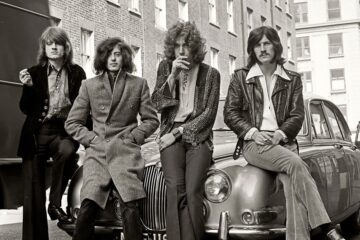Just a year after The Beatles broke up, the generally publicity-shy George Harrison put himself in the spotlight in the service of a cause in which he dearly believed. The Concert for Bangladesh, which was actually two shows that took place on August 1, 1971, in New York City, paved the way for all rock-star benefit concerts in its wake.
What’s amazing is how quickly it all came together. Here is the story of how Harrison learned about the strife in Bangladesh and then assembled a star-studded pair of concerts in a matter of a few months.
Ravi’s Plea
In June 1971, George Harrison took a trip to Los Angeles to help out his good friend Ravi Shankar put together the soundtrack for a documentary focused on Shankar’s life. Shankar was preoccupied by news coming out the region originally known as East Pakistan, which was attempting to become an independent state of Bangladesh due to conflict with West Pakistan. War ensued and created a massive crisis among the people of the region, many of whom became war refugees, dealing with all sorts of privation.
Shankar, whose father had been from the region, had the instinct to put together a concert that would help alleviate the crisis, but he was thinking about it on a much smaller scale. Harrison, who wasn’t long removed from being in the most successful band in the world, was used to going big, and he quickly went to work with Shankar to organize an event on a much grander scale.
Harrison hustled into the studio and put out the single “Bangla Desh” in July 1971 to bring some awareness to the cause, which wasn’t all that well-publicized in the U.S. This was also an excellent way to bring attention to the planned benefit, for which he secured Madison Square Garden. Ticket demand was so great it was decided there would be both an afternoon and evening show on August 1, 1971. From there, it was just a matter of seeing who would show up.
The Big Gets: Clapton and Dylan
Shaky though relations might have been among the four Beatles circa 1971, Harrison put aside that rancor and asked each of his bandmates to participate. Paul McCartney considered, but ultimately balked because of the involvement of Allen Klein, whom Macca had tried to prevent from getting involved with the Fab Four’s affairs in the group’s final days. John Lennon was on much better terms with Harrison at the time, but allegedly backed out just a few days before the show because Harrison wouldn’t allow Yoko Ono to perform her material.
Ringo Starr did accept the invitation, and he worked both as part of the outstanding backing band (which also included luminaries like Leon Russell, Billy Preston, Jim Keltner, Klaus Voorman, and several members of Badfinger) and as lead performer on his hit “It Don’t Come Easy.” Harrison also put in calls to his good friends Eric Clapton and Bob Dylan. Clapton, who was battling drug problems, dutifully showed, although he simply performed as part of the ensemble and didn’t take any lead vocals.
As for Dylan, his reluctance to make live appearances at this juncture of his career was well-known, which caused Harrison to doubt whether he’d show up, even after he agreed he would. But Dylan came through as asked, performing five songs in each of the shows as a kind of co-headliner with Harrison and Shankar.
An Album and a Movie
Harrison and company actually had a much easier time putting the shows together than they did getting the album and film of the shows to the public. Battles between record companies and struggles with government agencies about taxes delayed matters. The album finally showed up in December ’71 in the U.S. and January ’72 in the UK, with the film debuting a few months later in 1972.
The film had to find its way around camera issues that went unnoticed until after the concert was over. The Concert for Bangladesh album, credited to Harrison and Shankar, mostly avoided those problems. It’s overlong (three albums worth), but it’s worthwhile as a document of both Harrison performing energetic versions of songs from his classic All Things Must Pass and Dylan working his way back into his live groove.
Once logistical issues were worked out, proceeds from The Concert for Bangladesh began to make their way to the intended recipients. George Harrison pulled it off in the end, and events like Live Aid are hard to imagine without that legendary event acting as the one of the first altruistic shows of its kind.



